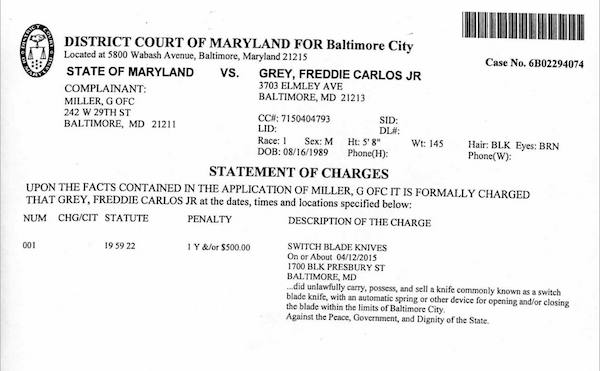Confirmed – Freddie Gray’s Knife WAS Illegal
Current score: Legal Insurrection 1, Prosecutor Mosby 0

Last Friday, while Prosecutor Mosby was announcing her poorly supported tsunami of charges against the six police officers involved in arresting and transporting the ill-fated Freddie Gray, Mosby also remarked that Gray’s knife–claimed by police to be the probable cause for his arrest–was in fact lawful under Maryland law.
As reported by the New York Times:
Ms. Mosby faulted the police conduct at every turn. The officers who arrested him “failed to establish probable cause for Mr. Gray’s arrest, as no crime had been committed,” she said, describing the arrest as illegal. Officers accused him of possession of a switchblade, but Ms. Mosby said, “The knife was not a switchblade and is lawful under Maryland law.
This rather perfunctory statement certainly raised my eyebrows, for several reasons.
Whether Knife Was Actually Unlawful Is Irrelevant to Probable Cause
First, whether the knife was actually lawful under Maryland law is largely irrelevant for purposes of probable cause.
Probable cause is based on whether a reasonable police officer under the circumstances would have genuinely believed the knife to have been unlawful. If so, the fact that the knife might later be determined to be lawful would certainly be cause to discontinue efforts to prosecute, but it wouldn’t retroactively make the officer’s conduct in making the initial arrest unlawful.
When making an assessment of probable cause for an arrest, the officer is not tasked with making an absolute determination of whether the conduct in question is unlawful. After all, that can ultimately only be done by a jury, necessarily a decision that occurs many steps downstream from the street arrest.
Rather, the arresting officer is merely tasked with determining whether probable cause exists that the conduct in question is unlawful. Note the word of the use probable. This allows for the possibility that the cause is not actual. Merely probable.
Certainly, one can imagine situations in which a given knife falls so far from the legal definition of unlawful types that no reasonable officer could have believed it to be within that unlawful category. If so, a mistaken belief that the knife was unlawful would not be reasonable, and probable cause would be lacking, and the arrest would be unlawful.
Worse, one can imagine an arrest involving malice, where an officer knew full well that the knife in question did not fall within the unlawful category, and decided to fraudulently claim probable cause to effect the arrest. Obviously such would be an unlawful arrest.
One can also imagine, however, situations in which a given knife could well reasonably appear to fall within the legal definition of unlawful types. As a result, a reasonable officer might reasonably, if mistakenly, believe it provided probable cause for an arrest. In this scenario the arrest, as an act of the officer, is lawful, even if later the underlying facts of the arrest are found not to constitute a crime (e.g., closer, better-informed, off-the-street inspection of the knife discloses it is, in fact, not unlawful).
In Gray’s instance, it is not disputed that possession of a “switchblade” knife is unlawful anywhere in Maryland. It has been widely reported (and now confirmed, as discussed below) that Gray’s knife was of a different mechanism, known as a “spring-assisted knife.”
Both of these types of mechanisms have specific technical definitions that allow the well-informed examiner to differentiate between the two.
It is also true, however, that they appear sufficiently similar in operation that someone lacking specialized knowledge could easily and reasonably believe a “spring-assisted knife” to fall within the “switchblade” category. The video below illustrates this similarity of operation (the first knife is the assisted-opening, the second the switchblade):
If the arresting officer(s) in Gray’s case reasonably believed that the spring-assisted knife in Gray’s possession fell into the unlawful category, then the legal requirement for probable cause in making their arrest has been met, regardless of whether upon later inspection and assessment the knife is determined to be unlawful.
Thus Mosby’s claim that Gray’s knife was ultimately determined to be lawful is largely irrelevant to the issue of whether the officers had probable cause to arrest Gray.
Mosby Statement Reflects Jurisdictional Sloppiness
As we noted in our Friday post on Mosby’s statement, it also reflects remarkable jurisdictional sloppiness, especially coming from a state prosecutor who works primarily in the relevant subsidiary jurisdiction of that state. As reported by the New York Times, Mosby is quoted as explicitly stating that:
The knife was not a switchblade and is lawful under Maryland law. (emphasis added)
Maryland law, however, is utterly irrelevant to Gray’s arrest, because he was not arrested for a violation of Maryland law. Rather he was arrested for a violation of the City Code of Baltimore.
The City of Baltimore has adopted as an ordinance its City Code §59-22, which states in relevant part:
Switch-blade knives. (a) Possession or sale, etc., prohibited. It shall be unlawful for any person to sell, carry, or possess any knife with an automatic spring. (emphasis added)
The description of the charge brought against Gray explicitly provides that he
did unlawfully carry, possess and sell a knife commonly known as a switch blade knife, with an automatic spring or other device for opening and/or closing the blade within the limits of Baltimore City. (emphasis added)
As we noted in our post last Friday (added – link here):
Thus (and again assuming Gray’s knife was spring-assisted, as widely reported), even if Mosby is correct (unlikely) that the knife was legal under Maryland state law, it would still arguably have been illegal under Baltimore code §59-22.
Task Force Finds Gray’s Knife Unlawful Under Baltimore Law
Now, we can remove the word arguably from the above statement, as a Baltimore Police Department Task Force has determined conclusively that Gray’s knife was of the spring-assisted type, and that such spring-assisted knives fall within the scope of Baltimore code §59.22.
As reported by the Baltimore Sun yesterday:
While Mosby said Friday that the officers had made an illegal arrest because a knife Gray was carrying was not a “switchblade,” a violation of state law, the police task force studied the knife and determined it was “spring-assisted,” which does violate a Baltimore code. (emphasis added)
I can already hear the counter-argument: That just makes it a tie, Mosby’s office says the knife was lawful, the Baltimore Police Department (biased in favor of the accused officers) says the knife was unlawful. No winner.
That, of course, would be an improper understanding of where things stand.
First, as already discussed, Mosby’s conclusion of lawfulness was under the irrelevant Maryland law, not the relevant Baltimore code.
Second, for Gray’s arrest to have been unlawful it would be necessary that there was no possibility a reasonable officer would have perceived Gray’s knife as violating the Baltimore code.
Now that the Baltimore Police department has determined the knife did, in fact, violate the code, any argument that a street cop making an arrest on the city’s streets was unreasonable in coming to the same conclusion is simply not credible.
This remains true even if the task force’s determination is later itself determined to be incorrect. If an organized task force of senior officers in the safety of police HQ makes a determination that Gray’s knife is unlawful, no police officer who had come to the same conclusion in much less favorable circumstances on the street in the course of evaluating probable cause in real-time is going to be held to have been unreasonable.
OK, folks, that’s it for now. Obviously keep your eyes here for ongoing coverage of the debacle that is the Mosby “Freddie Gray Case” prosecutions.
–-Andrew, @LawSelfDefense
NEW! The Law of Self Defense proudly announces the launch of it’s online, on-demand state-specific Law of Self Defense Online Training. These are interactive, online versions of the authoritative 5-hour-long state-specific Law of Self Defense Seminars that we give all over the country, but from the convenience of your laptop, tablet, or smartphone, and on your own schedule. Click over for more information on our state-specific Law of Self Defense Online Training, and get access to the ~30 minute Section 1. Introduction for free.
Andrew F. Branca is an MA lawyer and the author of the seminal book “The Law of Self Defense, 2nd Edition,” available at the Law of Self Defense blog (autographed copies available) and Amazon.com (paperback and Kindle). He also holds Law of Self Defense Seminars around the country, and provides free online self-defense law video lectures at the Law of Self Defense Institute and podcasts through iTunes, Stitcher, and elsewhere.
 DONATE
DONATE
Donations tax deductible
to the full extent allowed by law.








